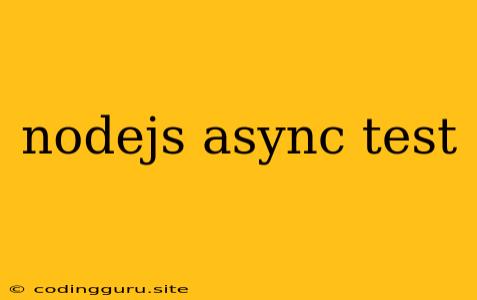Mastering Asynchronous Operations in Node.js Tests
Asynchronous programming is a fundamental aspect of Node.js, and testing these operations effectively is crucial for building robust and reliable applications. While synchronous tests are straightforward to write, asynchronous functions pose unique challenges due to their non-blocking nature. This article delves into the world of nodejs async test techniques, providing you with the knowledge and tools to confidently tackle these tests.
Understanding Asynchronous Behavior
At its core, asynchronous code means that the execution of your function doesn't immediately complete. It hands off the control to other processes, often waiting for external resources like network requests or database interactions. This non-blocking nature is a key advantage of Node.js, allowing it to handle concurrent tasks efficiently. However, for testing, it requires special consideration.
Why are Asynchronous Tests Important?
Imagine you have a function that fetches data from an API. If your test simply calls this function and expects an immediate result, it will fail. The function hasn't finished its asynchronous task yet, leaving your test incomplete. That's where asynchronous testing comes in. It enables us to:
- Verify the correct execution of asynchronous code. Are the promises resolving properly? Are callbacks being triggered as expected?
- Handle potential errors gracefully. Asynchronous operations are prone to errors like network issues or database failures. Tests can help ensure your code gracefully handles these situations.
- Test the final state of your application after asynchronous tasks complete. This is crucial for verifying that the intended actions have been performed and that your application remains consistent.
Common Node.js Testing Frameworks for Async Testing
Node.js boasts several robust testing frameworks that provide the necessary tools for asynchronous testing:
- Jest: Widely popular and integrated with many tools, Jest offers features like mocking, snapshot testing, and excellent support for asynchronous code.
- Mocha: A flexible framework known for its extensive plugin ecosystem and ease of use.
- Jasmine: A behavior-driven development framework with a focus on readability and expressiveness.
Techniques for Writing Asynchronous Tests
Let's dive into some essential techniques for crafting robust asynchronous tests:
-
Callbacks: Callbacks are a traditional approach to handling asynchronous tasks in Node.js. You pass a function as an argument to your asynchronous function, and this callback is executed once the task completes.
const myAsyncFunction = (callback) => { setTimeout(() => { callback(null, 'Data successfully retrieved'); }, 1000); }; test('myAsyncFunction should return data after a delay', (done) => { myAsyncFunction((err, data) => { expect(err).toBeNull(); expect(data).toBe('Data successfully retrieved'); done(); // Signal the test is finished }); }); -
Promises: Promises provide a cleaner and more structured way to handle asynchronous operations.
const myAsyncFunction = () => { return new Promise((resolve, reject) => { setTimeout(() => { resolve('Data successfully retrieved'); }, 1000); }); }; test('myAsyncFunction should return data after a delay', async () => { const data = await myAsyncFunction(); expect(data).toBe('Data successfully retrieved'); }); -
Async/Await: Async/await provides a more synchronous-looking syntax for dealing with asynchronous operations. It makes your code easier to read and understand, while still maintaining the non-blocking nature of Node.js.
const myAsyncFunction = () => { return new Promise((resolve, reject) => { setTimeout(() => { resolve('Data successfully retrieved'); }, 1000); }); }; test('myAsyncFunction should return data after a delay', async () => { const data = await myAsyncFunction(); expect(data).toBe('Data successfully retrieved'); });
Best Practices for Node.js Async Tests
- Keep tests focused: Each test should focus on a single aspect of your code. Avoid cramming multiple asynchronous operations into one test.
- Use meaningful test descriptions: Clearly communicate the purpose of your tests using descriptive names.
- Handle errors gracefully: Expect errors where they might occur and write code to handle them appropriately.
- Mocking and stubbing: Employ techniques like mocking to isolate your code and prevent dependencies from interfering with your tests.
- Utilize test runners: Frameworks like Jest provide excellent test runners that can organize your tests, execute them efficiently, and provide helpful feedback.
Conclusion
Mastering nodejs async test is an essential skill for any Node.js developer. By understanding asynchronous concepts and applying the techniques discussed, you can write comprehensive, reliable, and maintainable tests that ensure your code operates as expected. The ability to thoroughly test asynchronous code is critical for building robust and trustworthy Node.js applications.
